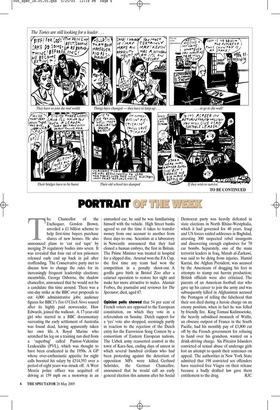PORTRAIT OF THE WEEK T he Chancellor of the Exchequer, Gordon
Brown, unveiled a £1 billion scheme to help first-time buyers purchase shares of new homes. He also announced plans to ‘cut red tape’ by merging 29 regulatory bodies into seven. It was revealed that four out of ten prisoners released early end up back in jail after reoffending. The Conservative party met to discuss how to change the rules for its increasingly frequent leadership elections; meanwhile, George Osborne, the shadow chancellor, announced that he would not be a candidate this time around. There was a one-day strike at the BBC over proposals to cut 4,000 administrative jobs; audience figures for BBC1’s Ten O’Clock News soared after its highly paid newsreader, Huw Edwards, joined the walkout. A 17-year-old girl who starred in a BBC documentary recreating the early settlement of Australia was found dead, having apparently taken her own life. A Royal Marine who scratched his leg on a training run died from a ‘superbug’ called Panton-Valentine Leukocidin (PVL), which was thought to have been eradicated in the 1950s. A GP whose over-enthusiastic appetite for night calls boosted his salary by £514,593 over a period of eight years was struck off. A West Mercia police officer was acquitted of driving at 159 mph on a motorway in an unmarked car; he said he was familiarising himself with the vehicle. High Street banks agreed to cut the time it takes to transfer money from one account to another from three days to one. Scientists at a laboratory in Newcastle announced that they had cloned a human embryo, the first in Britain. The Prime Minister was treated in hospital for a slipped disc. Arsenal won the FA Cup, the first time any team had won the competition in a penalty shoot-out. A gorilla gave birth in Bristol Zoo after a cataract operation to restore her sight and make her more attractive to males. Alastair Forbes, the journalist and reviewer for The Spectator, died, aged 87.
Opinion polls showed that 54 per cent of French voters are opposed to the European constitution, on which they vote in a referendum on Sunday. Dutch support for a ‘yes’ vote also dropped, seemingly partly in reaction to the rejection of the Dutch entry for the Eurovision Song Contest by a consortium of Eastern European nations. The Uzbek army reasserted control in the town of Kara-Suu, ending days of unrest in which several hundred civilians who had been protesting against the detention of opposition MPs were killed. Gerhard Schröder, the German Chancellor, announced that he would call an early general election this autumn after his Social Democrat party was heavily defeated in state elections in North Rhine-Westphalia, which it had governed for 40 years. Iraqi and US forces raided addresses in Baghdad, arresting 300 suspected rebel insurgents and discovering enough explosives for 70 car bombs. Separately, one of the main terrorist leaders in Iraq, Musab al-Zarkawi, was said to be dying from injuries. Hamid Karzai, the Afghan President, was accused by the Americans of dragging his feet in attempts to stamp out heroin production; British officials were also criticised. The parents of an American football star who gave up his career to join the army and was subsequently killed in Afghanistan accused the Pentagon of telling the falsehood that their son died during a heroic charge on an enemy position, when in fact he was felled by friendly fire. King Tomasi Kulimoetoke, the heavily subsidised monarch of Wallis, an obscure outpost of France in the South Pacific, had his monthly pay of £3,800 cut off by the French government for refusing to hand over his grandson, wanted on a drink-driving charge. Six Pitcairn Islanders convicted of sexual abuse of underage girls lost an attempt to quash their sentences on appeal. The authorities in New York State admitted that 198 convicted sex offenders have received free Viagra on their release because a badly drafted law gave them entitlement to the drug. RJC






















































 Previous page
Previous page